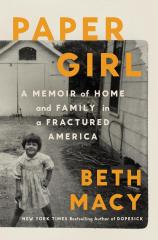Reading Group Guide
Discussion Questions
Paper Girl: A Memoir of Home and Family in a Fractured America

1. What is your relationship with your hometown and friends/family who still live there? Like Beth Macy, have aspects of your values or interests drifted away from those of the people you grew up with? How have you navigated nostalgia for the way things were when you visit in the present? What’s changed more --- you or the place?
2. What are the biggest sources of conflict among your family --- whether politics, religion, culture, or even more specific differences that have arisen due to personal circumstances? Have you tried to smooth out those conflicts with conversation or other tools, and if so, what were the results? If you haven’t tried, what prevents you from doing so?
3. Among these conflicts, which do you most ardently defend? Macy’s book covers many aspects of the transformation of Urbana, but her strongest defense is for education. She sees the decline in public schools and accessible higher education as a root cause in the difficulties youth face in overcoming poverty and being persuaded by far-right/extremist politics. Do you hold a similar “root cause” theory about the web of conflicts in your family, community and/or country?
4. How has higher education, or lack of access to it, affected your sense of health and well-being, access to medical care and job opportunities, and sense of agency in your life? Do you agree with Macy that the defunding of higher education is part of the downfall of places like Urbana and other small American towns?
5. Macy describes many specifics of the current landscape of Urbana, from political affiliations to socioeconomic statistics. What surprised you most about these details and the real people they describe? Did anything sound comparable to where you live or have lived, even elsewhere in the country?
6. Prior to reading this book, what did you know --- or experience firsthand --- about the effects of NAFTA and globalized supply chains on American manufacturing and economics? How did this book highlight the ways these policies backfired and the ways towns like Urbana have been forced to adjust?
7. Macy profiles exceptional teens --- Silas, Maddie and Grace --- who have moved through traumatic events with resilience and who offer hope for the youth of Urbana. What factors contributed to their ability to overcome the odds of their ongoing struggles? Does Macy project 100 percent confidence that they will stay on track? What do you think will happen to them?
8. When considering complex issues like poverty, mental health and political engagement, what is the role of context, i.e., “peer pressure,” especially in insular small towns like Urbana where there is a “heightened sense of civic ownership.” As one interviewee tells Macy, “People here think they know where they live. But when you share things they have no idea about, things that unmoor them from what they think they know, they’ll attack whoever’s sharing it” (p. 297)?
9. In her interviews, Macy reconnects with people whom she hasn’t seen in years --- like her ex-boyfriend, Bill, who swung from the far left to the far right, and even her sister, Cookie. Do you think her trauma-informed training and journalism experience facilitated these conversations, or made them more contentious?
10. Have you ever known someone like Bill, who radically changed their opinion on a certain value or stance? Or perhaps you have yourself? What factors contributed to that realignment, and how did others in their/your old community react?
11. What did you think of Cookie’s response to hearing her interview read back to her (and the story about her daughter, Liza, being sexually abused by Cookie’s husband)? Could you relate to the sense of shock upon having your own story reflected back to you, in writing or in another form?
12. In places like Urbana, how do you think religious groups shape individual and collective decisions? How does this compare to the national influence of religion? In your opinion, would a renaissance of religious groups more broadly bolster community engagement, as they once did in the past, or deepen existing divides?
13. How did Macy’s mother’s illness and death reunite the siblings, and bring to the fore their ongoing differences? How have your opinions about loved ones, even difficult people, changed near or after their death? Macy cites “emerging neurological research [that] has shown clear links between despair and vulnerability to misinformation, right-wing radicalization, and violence” (p. 288). Between deaths of despair and those caused by misinformation about health care, discuss this “life-or-death” reality around extreme politics.
14. Have you ever had or known a mentor like David M. Sapp, when you were a student or at other times in life? How did these mentors support you?
15. Do you think there’s something special about music/arts education in uplifting kids and creating a sense of belonging? Both Silas and Macy found part of their identity in marching band. What do you think kids are losing with widespread cuts to arts education? What about sports?
16. Brooke Perry, the Urbana truancy officer, personally escorts kids to school who aren’t attending for a variety of reasons. What should schools offer kids when their home life is unstable, besides education? How does the mere fact of having to go to school at the same time every day support life skills, like Macy’s paper route? How do you see the future of school attendance changing, especially with increasing technology?
17. Throughout the book, Macy highlights how Urbana has been the home of conflicting historical moments: the somber observance of Abraham Lincoln’s body moving through the town by train, prejudice against Irish immigrants in the 19th century, and, of course, today’s political and socioeconomic extremes. Are there other areas in America, or elsewhere in the world, that carry such contradictory memories? How might we as a nation help to rectify rather than erase these memories?
18. Why do you think Mark Evans is committed to honoring his family’s heritage in Urbana, instead of moving somewhere else where he might be among more like-minded people? What are the values and challenges of trying to change a system from within in this way?
19. What are your hopes and fears for the future of the United States? If you live in another country, how might the US impact your part of the world through politics/politicians, economics, judicial precedents and cultural norms?
Paper Girl: A Memoir of Home and Family in a Fractured America
- Publication Date: October 7, 2025
- Genres: Memoir, Nonfiction
- Hardcover: 368 pages
- Publisher: Penguin Press
- ISBN-10: 0593656733
- ISBN-13: 9780593656730







